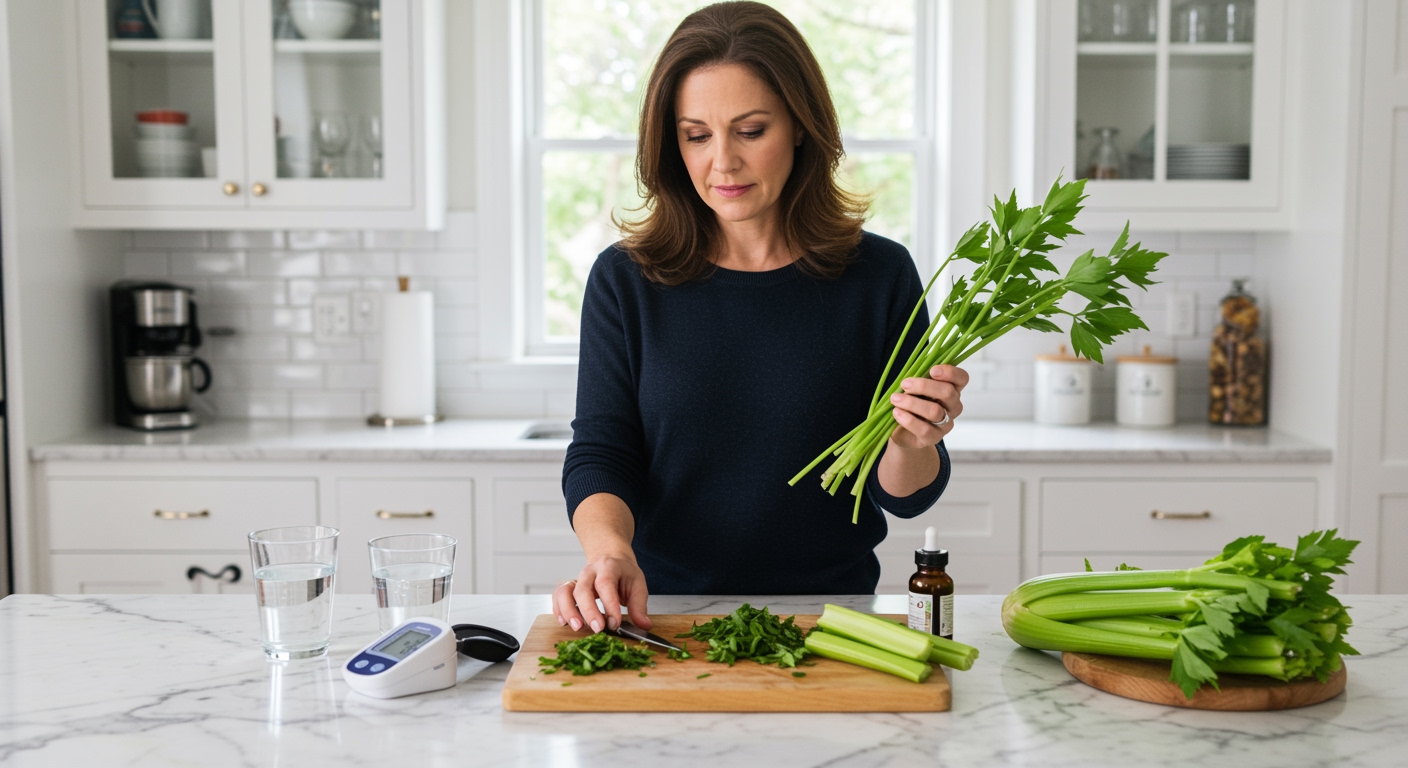✪ Key Takeaway: Low blood pressure patients should avoid lovage as it can further lower blood pressure and worsen hypotension symptoms.
Introduction
Your grandmother swears by lovage for cooking, but your blood pressure readings have been consistently low lately.
You might be wondering if this aromatic herb could make your hypotension worse or if it is safe to include in your daily routine.
Hi, I am Abdur, your nutrition coach and today I am going to explain whether low blood pressure patients should avoid lovage and what science tells us about this herb.
What Exactly Is Lovage And How Does It Work?
Lovage is a perennial herb that belongs to the celery family and has been used in traditional medicine for centuries.
The scientific name Levisticum officinale reveals its long history as an official medicinal plant in European pharmacopoeias.
This herb contains several bioactive compounds including phthalides, coumarins, and volatile oils that affect your cardiovascular system.
Research shows that lovage acts as a natural vasodilator, which means it relaxes and widens your blood vessels.
When blood vessels dilate, the pressure inside them decreases because blood has more space to flow through.
This mechanism explains why lovage has traditionally been used to treat high blood pressure and heart conditions.
✪ Fact: Lovage contains the same phthalides found in celery that contribute to blood pressure reduction.
Why Could Lovage Be Dangerous For Hypotension?
Low blood pressure, or hypotension, occurs when your systolic pressure drops below 90 mmHg or diastolic below 60 mmHg.
People with hypotension already struggle with insufficient blood flow to vital organs like the brain, heart, and kidneys.
Adding lovage to this situation creates a potentially dangerous combination because the herb further reduces blood pressure.
The vasodilating effects of lovage could push your already low blood pressure to critically low levels.
This can trigger symptoms like severe dizziness, fainting, rapid heartbeat, and even shock in extreme cases.
Your body compensates for low blood pressure by increasing heart rate and constricting blood vessels, but lovage works against these natural protective mechanisms.
✪ Pro Tip: Monitor your blood pressure regularly if you use any herbs, even those considered generally safe.
What Symptoms Should You Watch For?
If you have low blood pressure and accidentally consume lovage, several warning signs may appear within hours.
Dizziness when standing up, known as orthostatic hypotension, becomes more pronounced and dangerous.
You might experience extreme fatigue because your organs are not receiving adequate blood supply.
Nausea and vomiting can occur as your digestive system struggles with reduced blood flow.
Some people report feeling confused or having difficulty concentrating because the brain is not getting enough oxygen-rich blood.
In severe cases, you might experience chest pain, rapid breathing, or even lose consciousness.
These symptoms require immediate medical attention because they indicate your blood pressure has dropped to dangerous levels.
✪ Note: Never ignore sudden worsening of hypotension symptoms after consuming any new herb or supplement.
Are There Safe Alternatives For Low Blood Pressure?
Instead of lovage, focus on herbs and foods that can help stabilize or raise your blood pressure naturally.
Licorice root contains compounds that can increase blood pressure by affecting sodium retention in your kidneys.
Ginseng has been shown to help normalize blood pressure in people with hypotension without causing dangerous spikes.
Rosemary contains compounds that can stimulate circulation and provide gentle support for low blood pressure.
Increasing your salt intake moderately and staying well-hydrated are simple dietary approaches that often help.
Small, frequent meals prevent the postprandial hypotension that occurs when blood pools in your digestive system after eating.
Always work with your healthcare provider to develop a safe plan for managing low blood pressure through diet and lifestyle changes.
✪ Pro Tip: Keep a food and symptom diary to identify which foods help or worsen your blood pressure symptoms.
The Bottom Line
Low blood pressure patients should definitely avoid lovage because this herb can dangerously lower already compromised blood pressure levels.
When managing hypotension, every dietary choice matters because your margin for error is smaller than most people realize.
I would love to hear about your experiences with herbs and low blood pressure management, so please share your questions or feedback in the comments below.
References
At NutritionCrown, we use quality and credible sources to ensure our content is accurate and trustworthy. Below are the sources referenced in creating this article:
- Herbal Reality: Lovage
- Herbal Reality: Low Blood Pressure
- WebMD: Lovage
- Mayo Clinic: Herbal Supplements





